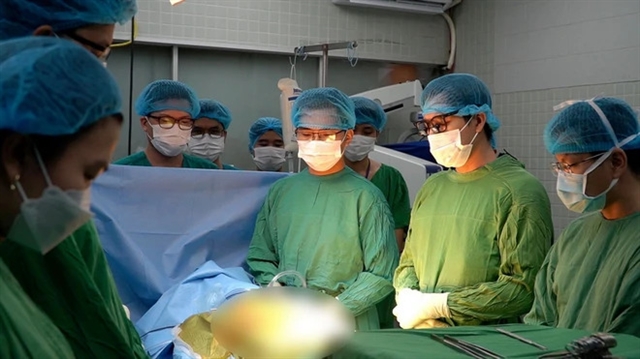 Society
Society

 |
| Doctors at Chợ Rẫy Hospital observe a minute of silence before receiving organs from a donor. — VNA/VNS Photo |
HÀ NỘI — Health experts have proposed adjusting regulations regarding the age limit for organ donation from brain-dead people to help save more lives.
This recommendation was heard at a scientific workshop contributing ideas to the draft law outline amending and supplementing several articles of the Law on donation, removal and transplantation of human tissues and organs and the donation and recovery of cadavers, organised by the Ministry of Health (MoH) on Monday in Hà Nội.
According to the representative of the National Coordination Centre for Organ Transplants under the Ministry of Health, Việt Nam conducted its first organ transplant in 1992.
The first organ transplant from a brain-dead donor took place at Chợ Rẫy Hospital in 2010.
As of early October this year, after 31 years of organ transplants and 13 years of retrieving organs from brain-dead donors, the country has performed nearly 8,000 organ transplants.
The study shows that in most countries with the highest rate of brain-dead organ donors per million people in the world, 50 per cent of the cases come from both young people (under 18 years old) and elderly individuals (60 years old and above).
In these countries, there is no age limit for organ donation after death.
Some countries like South Korea set a lower age limit, allowing contributions from individuals as young as 16 years old, instead of the current age of 18 in Việt Nam.
According to Đỗ Trung Hưng, head of the Legal Department under the Ministry of Health, the current law has some shortcomings that need to be amended.
The first solution is to establish a database, creating a connection between those waiting for organ donations and potential organ donors.
"At present, our system only has information about those waiting for organ donations but lacks information about potential donors. Therefore, it is necessary to improve the comprehensive database across all hospitals," Hưng said.
He also proposed additional policies for the families of organ donors, such as enjoying free health insurance to encourage and support the families of organ donors.
During the workshop, Dr. Nguyễn Hoàng Phúc, deputy director of the National Coordination Centre for Organ Transplantation, suggested that Việt Nam should also establish a National Organ Donation Day, similar to many other countries around the world, such as August 3 in India, September 9 in South Korea and June 11 in China.
He proposed July 1 as the National Organ Donation Day for Việt Nam, aligning with the effective date of the organ donation law on July 1, 2007. — VNS




